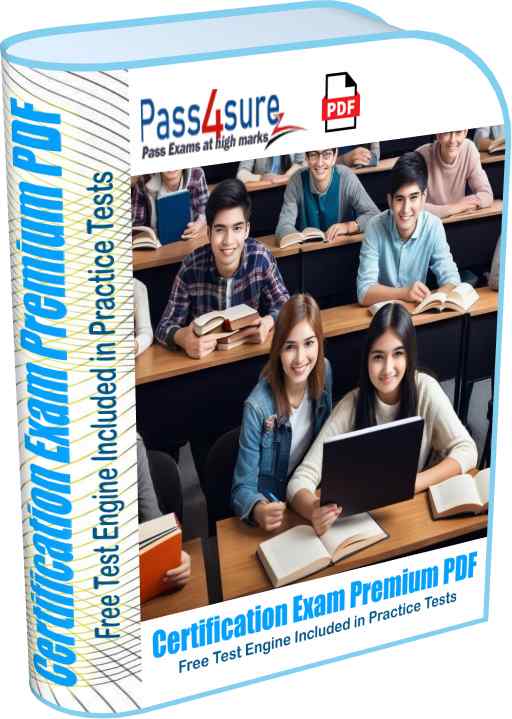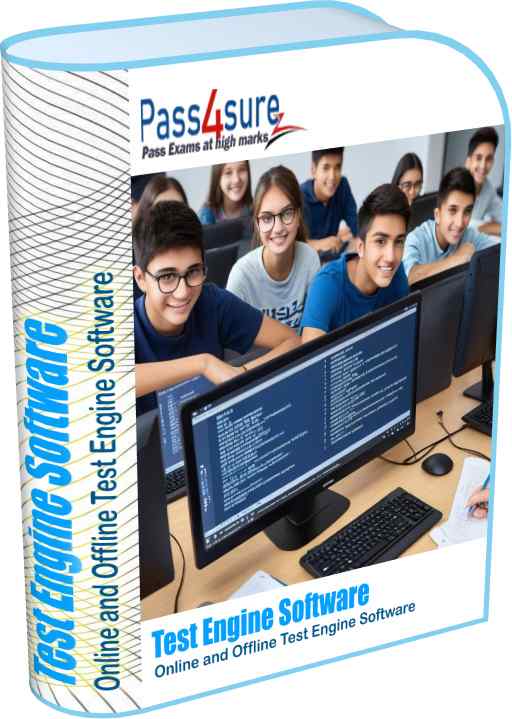| Exam Code | PMI-SP |
| Questions and Answers | 327 |
| Premium Access | Yes |
| Online Test Engine | Yes |
| Comprehensive Q&A | Yes |
| Success Rate | 98% |
| Real Questions | Yes |
| Updated Regularly | Yes |
| Portable Files | ✔ |
| Unlimited Download | ✔ |
| 100% Secured | ✔ |
| Confidentiality | 100% |
| Success Guarantee | 100% |
| Any Hidden Cost | $0.00 |
| Auto Recharge | No |
| Updates Intimation | by Email |
| Technical Support | Free |
| PDF Compatibility | Windows, Android, iOS, Linux |
| Test Engine Compatibility | Mac/Windows/Android/iOS/Linux |
| Sample Questions |  |
Pass4sure Practice Tests are an effective way to prepare for the PMI-SP exam. The practice tests include premium PDF and Test Engine Software. Pass4surez.in provides an extensive question bank to improve your knowledge and help you achieve high marks on the PMI-SP exam.
The PMI Scheduling Professional exam questions and answers on Pass4surez.in are regularly verified and updated to ensure they reflect the latest syllabus and topics covered in the real test. The certification exams and entry test exams from pass4surez.com make you familiar with the test environment. The goal is to enhance your knowledge of the PMI-SP exam and enable you to pass it on your first attempt.
The PDF of PMI-SP exam questions and answers provided by Pass4surez.in contains a comprehensive pool of questions and verified answers, including references and explanations where applicable. The objective is not only to help you pass the exam, but also to significantly improve your knowledge of the latest PMI-SP course topics.
 |
|
CERTIFICATION EXAM PREMIUM PDF
Pass4Sure provide premium PDF that contains all the questions and answers that are necessary to make your concepts about the exam topics clear and boost your knowledge about the exam. These questions and answers make you ready to face actual test in test centers. Our team keep on revising material and update the exam questions accordingly. You will feel confident in test center. Our support team keep on helping our customers to make their testing experience best. Our premium PDF files are searchable, convertable and printable at high quality to make book that you can study during traveling or during vacations. Our automated system sends intimation email to our customers on each update. The files in customer download section is overwritten with latest pdf files.
|
| |
|
 |
|
CERTIFICATION EXAM TEST ENGINE
Pass4sure test engine is best certification and examination preparation tool that help you make yourself ready to take the actual exam and get high marks in the exam. Our OTE (Online Test Engine) support all OS Platforms including iOS, Android, Windows, Linux, Chromebook etc and provide up to date experience to get ready for actual test. Our Offline Test Engine is compatible to all windows platforms including latest windows versions. Our test engines helps to familiarize actual test environment and makes you ready to take timed tests. Your performance history and graphs helps you to see when you are ready to sit in actual exam in test center. These test engines uses up to date and latest questions and answers, keeps on updating the questions pool and sends you intimation on each update.
|
Pass4sure Premium PDF and Test Engines support all platforms and devices including mobile devices and computers. You should download sample PDF and Test Engine to evaluate the product before you buy the full version. Our exam samples include some questions that may be or may not be up to date but full version is always up to date.
The Project Management Institute (PMI) ® offers a professional credential for project schedulers, known as the PMI Scheduling Professional (PMI-SP)®. PMIs professional credentialing examination development processes stand apart from other project management certification examination development practices. PMI aligns its process with certification industry best practices, such as those found in the Standards for Educational and Psychological Testing.
Although many of the domains, tasks, knowledge, and skills outlined by the PMI-SP Examination Content Outline are also covered by the Practice Standard for Scheduling and PMBOK® Guide, there are some that are unique to the PMI-SP Examination Content Outline. Candidates studying for the examination will certainly want to include the current edition of the Practice Standard for Scheduling and PMBOK® Guide as two of their references, and would be well advised to read other current titles on project scheduling.
Schedule Strategy 14%
Schedule Planning and Development 31%
Schedule Monitoring and Controlling 35%
Schedule Closeout 6%
Stakeholder Communications Management 14%
Total 100%
Domain 1: Schedule Strategy (14% of examination)
Task 1 Establish project schedule configuration management policies and
procedures incorporating best practices, regulations, governing standards
and organization policies, and procedures to ensure accessibility, storage,
retrieval, maintenance, change control, and baseline schedule control.
Task 2 Develop schedule approach, based on the unique characteristics of the
project, including enterprise environmental factors and organizational
process assets, in order to define schedule requirements.
Task 3 Establish scheduling policies and procedures regarding methodology,
selection of a scheduling tool, scheduling parameters, performance
thresholds, activity granularity, presentation format, earned value
management (EVM) implementation, analysis techniques, and approval
requirements by using resources such as organizational process assets and
project documents in order to develop the schedule management plan and
standardize operational procedures.
Task 4 Develop the scheduling-related components for project management plans
(for example, integration, scope, cost, quality, resources, communication,
risk, and procurement management), through review of contract
requirements, in order to integrate scheduling activities into the overall
project management process.
Task 5 Provide information about project scheduling objectives and goals, the role of
the scheduler, and scheduling procedures to project team members to
facilitate effective participation in the project.
Knowledge and Skills:
Applicable contract requirements, regulations, and governing standards
Schedule control processes (for example, baseline control, status update procedure, variance thresholds)
Scheduling development concepts (for examples, coding, work breakdown structures, organizational breakdown structure, resource breakdown structures)
Project charter
Domain 2: Schedule Planning and Development (31% of examination)
Task 1 Develop the work breakdown structure (WBS), organizational breakdown
structure (OBS), control accounts (CA), and work packages through
communication with subject matter experts and stakeholders and analysis of
the contractual commitments in order to ensure completion of the project
scope.
Task 2 Define activities and milestones through communication with subject matter
experts, decomposition, and application of scheduling policies and
procedures to identify and document the work to be performed.
Task 3 Estimate activity durations, utilizing subject matter experts and scheduling
techniques such as three-point estimate, parametric, analogous and/or
Program Evaluation and Review Technique (PERT) in order to develop an
overall schedule model.
Task 4 Sequence activities, incorporating defined dependencies (internal, external,
and cross programs) milestones, and constraints (for example, calendars,
geography, contracts), in order to develop a logical, dynamic schedule model.
Task 5 Identify critical and near-critical path(s) using techniques such as Critical
Path Method, Critical Chain, Program Evaluation and Review Technique
(PERT), and Monte Carlo simulation in order to meet project delivery date
requirements.
Task 6 Develop the project resource breakdown structure (RBS), determine resource
availability, and assign resources to activities by working with functional
managers, project managers, and project team members in order to define the
resource constrained schedule.
Task 7 Adjust schedule model based upon resource availability, available budget,
and other known constraints in order to calculate the resource constrained
schedule.
Task 8 Align schedule with the overall program plan or integrated master plan (IMP),
through review of enterprise objectives and contract documentation, in order
to ensure accomplishment of overall program objectives.
Task 9 Analyze major milestones against statement of work (SOW), the contract,
and/or memorandum of understanding, to assess whether schedule model
delivery estimates meet required deadlines.
Task 10 Perform schedule risk analysis using quantitative tools or techniques (for
example, what-if scenarios, Monte Carlo simulation) in order to determine if
project milestone dates are achievable within acceptable risk tolerances.
Task 11 Obtain a consensus of the project customer, sponsor, project manager, and
project team members, in order to establish an approved baseline schedule.
Task 12 Establish the Performance Measurement Baseline (PMB), using organizational
processes and standard techniques, in order to enable performance measurement and management.
Knowledge and Skills:
Scope statements, including deliverables and deadlines
Work breakdown structure (WBS)
Organizational breakdown structure (OBS)
Resource breakdown structure (RBS)
Cost structure as related to schedule development
Activity definition
Activity execution techniques (duration/time, effort/work)
Dependency relationship types (Finish to Start, Start to Finish, Finish to Finish, Start to Start)
Leads and lags
Prioritization within the schedule model
Resource groups
Resource calendars
Resource allocation techniques
Activity Network Diagram (AND)
Precedence Diagramming Method (PDM)
Capacity requirements/resource requirements
Contingency reserve or buffer (funds, budget, or time)
Cost and schedule integration
Schedule baselining
Performance Measurement Baseline (PMB)
Inter-project Dependencies
Milestone definition
Schedule model components
Schedule risk-assessment techniques (for example, Monte Carlo simulation, PERT)
Domain 3: Schedule Monitoring and Controlling (35% of examination)
Task 1 Collect activity status at defined intervals from activity owners via reports,
meetings, inspections, or other standard procedures in order to update and
review the project progress.
Task 2 Collect resource information and updates via reports, timesheets, meetings,
inspections, or other standard procedures in order to report on resource
utilization and availability.
Task 3 Perform schedule analysis and audit, on in-house and subcontractor
schedules, using industry standards, guidelines and best practices in order to
identify and report project schedule, status, changes, impacts or issues.
Task 4 Identify alternative project execution options, using tools and techniques
such as what-if scenario analyses, in order to optimize the schedule.
Task 5 Incorporate approved risk mitigation activities into the schedule, by utilizing
defined change control processes, in order to establish a new performance
measurement baseline (PMB).
Task 6 Update the schedule model and document schedule baseline changes,
received through formal change-control processes, in order to maintain an
accurate schedule and facilitate forensic schedule analysis, if required.
Knowledge and Skills:
Progress measurement techniques (for example, percent complete, actual/remaining duration, estimate to complete)
Industry standards, guidelines, and best practices with respect to activity status update frequency, format, and content
Metrics to monitor, analyze, and control the schedule
Cost and schedule reserve analysis
Activity prioritization
Available data, logical data organization/relationships within data elements
Electronic file storage and retrieval standards
Resource breakdown structure (RBS)
Resource calendars
Resource groups
Resource allocation techniques
Schedule risk analysis
Project schedule change control
Reserve analysis
Knowledge of ongoing audit analysis
Activity Network Diagram (AND)
Precedence Diagramming Method (PDM)
Schedule risk assessment techniques (for example, Monte Carlo simulation, Program and Evaluation Review Technique [PERT])
Schedule and cost variance management
Domain 4: Schedule Closeout (6% of examination)
Task 1 Obtain final acceptance of the contractual schedule components, by working
with sponsor and/or customer, in order to facilitate project closeout.
Task 2 Evaluate final schedule performance against baseline schedule, scheduling
approach and the implementation, using standard scheduling tools and
techniques, including solicitation of feedback from stakeholders, in order to
identify lessons learned and develop best practices.
Task 3 Update the organizational process assets, through documentation of
identified lessons learned and best practices, in order to improve business
processes.
Task 4 Distribute final schedule reports, including earned value management (EVM)
calculations and variance analysis, to stakeholders in order to facilitate
project closeout.
Task 5 Archive schedule files (for example, final schedule model, schedule
management plan, periodic status reports, schedule change log), as per
defined procedures in order to satisfy contractual requirements and prepare
for potential forensic schedule analysis.
Knowledge and Skills:
Contractual schedule components
Schedule close-out procedures
Feedback techniques
Schedule review techniques
Schedule issue management
Transition planning
Domain 5: Stakeholder Communications Management (14% of examination)
Task 1 Develop and foster relationships with project stakeholders, consistent with
the communication management plan, in order to enhance support for the
project schedule.
Task 2 Generate and maintain visibility of project schedule, by working with the
project manager and/or stakeholders, in order to maintain stakeholder
support.
Task 3 Provide senior management and other stakeholders with verbal and written
schedule status updates and impact on schedule of corrective actions, as
defined by the communication management plan, in order to maintain
stakeholder awareness.
Task 4 Communicate schedule issues that could impact delivery of project scope or
adherence to the schedule management plan, in order to elevate awareness to
relevant stakeholders.
Knowledge and Skills:
Targeting communications to senior management
Methods and techniques used to maintain visibility of project schedule Elements of the communication management plan Oral and written communication tools and techniques
Targeting communications to intended audience
Presentation tools and techniques
Negotiation
Facilitation
Cultural sensitivity and diversity
Conflict resolution
Project life cycle
Stakeholder-impact analysis
Change management/control
Scheduling terminology
Organizational process assets
Project management software
Project management information systems
Schedule documentation and reporting techniques
Scheduling data management procedures (for example, archiving, storage, retrieval)
Estimation techniques (for example, analogy based estimation, parametric estimation, historical data, expert estimation)
Scheduling methods (for example, critical path method, critical chain, linear, agile)
Scheduling techniques (for example, resource leveling, schedule compression, simulation)
Earned Value Management (EVM)
Gantt Charts
Quantitative and qualitative schedule analysis (for example, schedule performance index, baseline execution index, float analysis)
Problem-solving tools and techniques
Contract schedule requirements
You can download a free PDF of the PMI-SP practice test and study guide to try before purchasing the premium files. To ace the exam, simply download the PMI-SP exam questions and answers file, memorize the content, and practice with the VCE Exam Simulator. This will ensure you are fully prepared for the real test.
The PMI-SP PDF practice test and exam questions and answers can be accessed on any device, including iPhone, iPad, Android, and Windows. You can download the PDF to your computer or any other device and start studying. Additionally, you can download and install the VCE Exam Simulator for further practice. The PMI-SP PDF is printable in high quality, allowing you to take it with you on vacations or while traveling. Your updated PMI-SP exam files can be accessed anytime from your online account, and you will receive your login credentials immediately after purchase.


